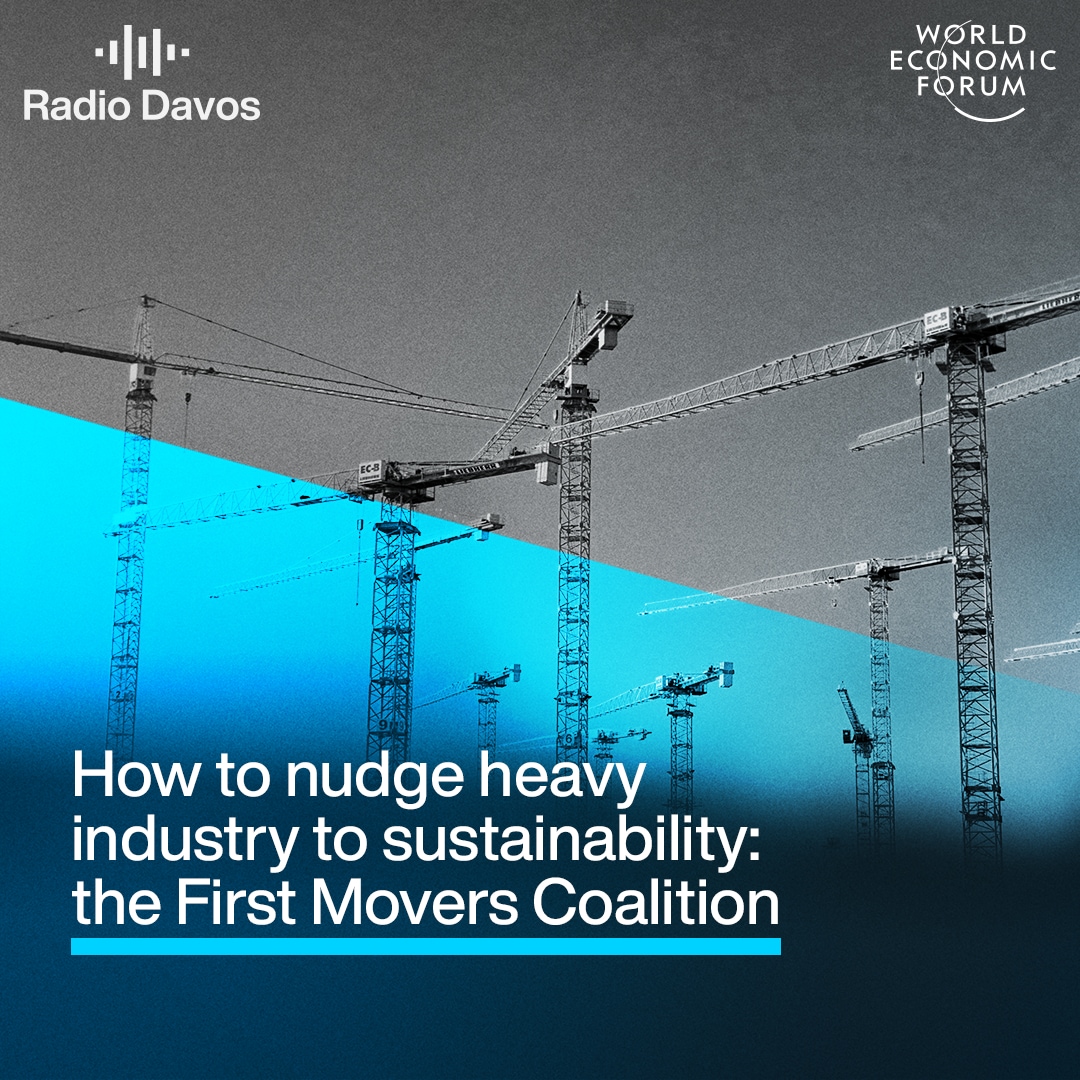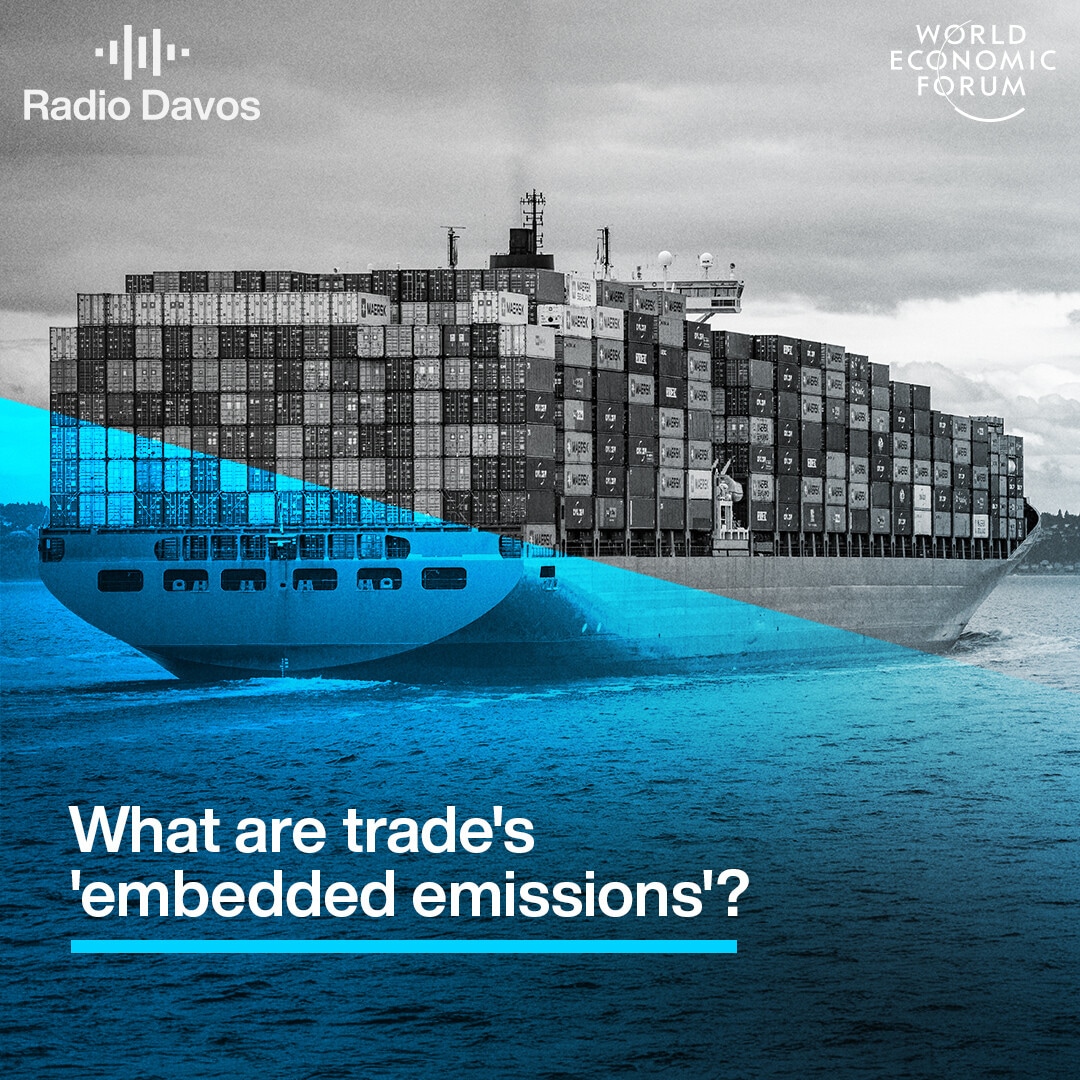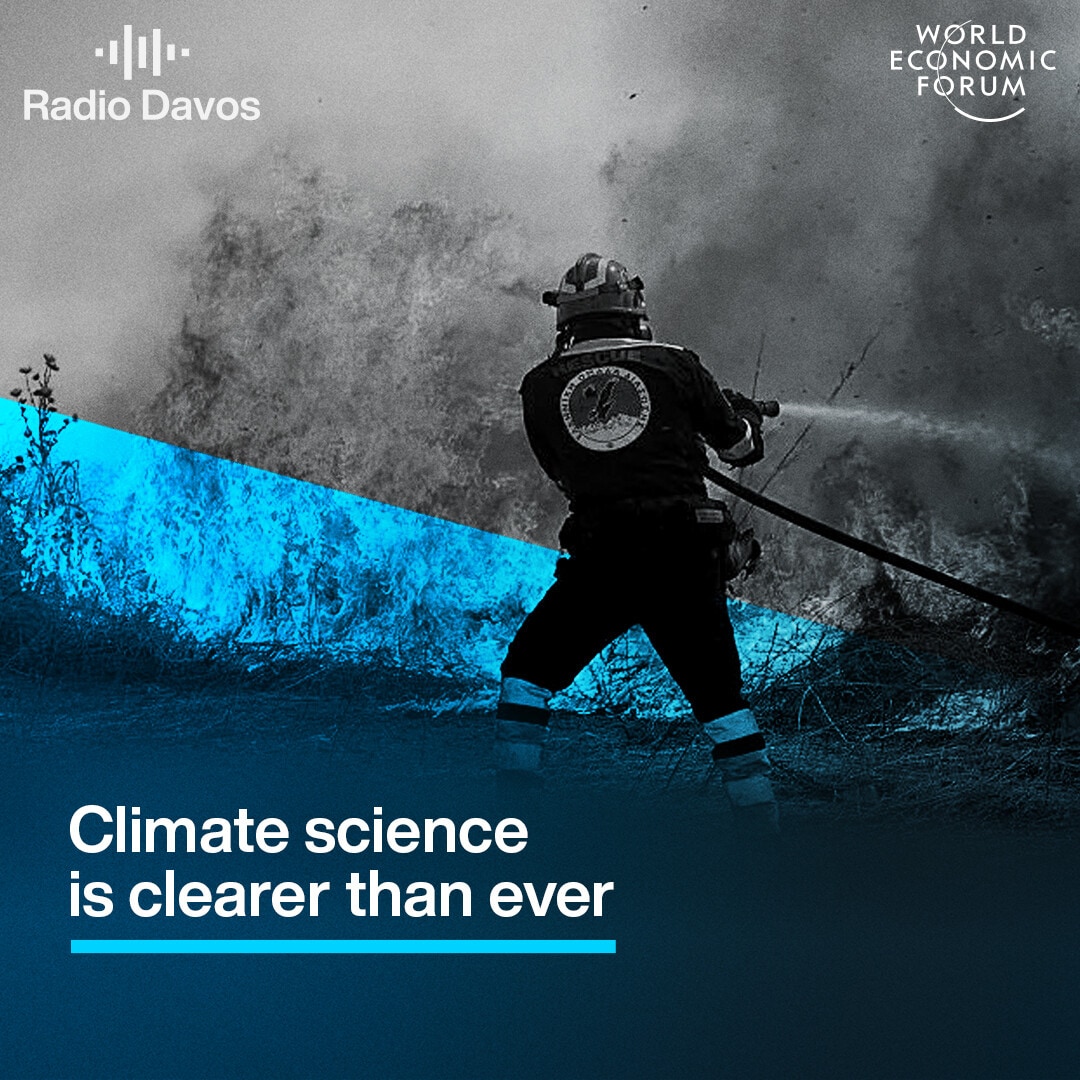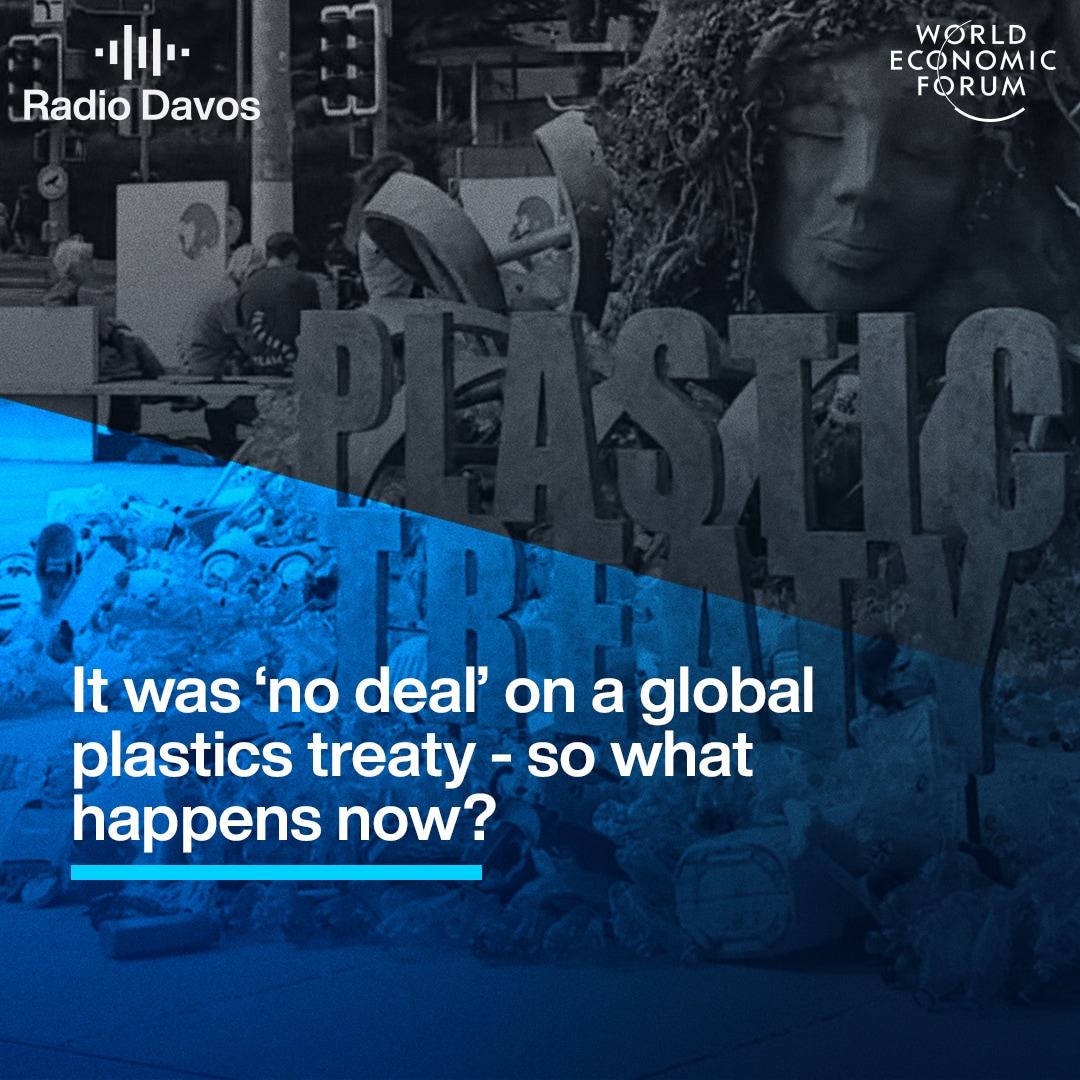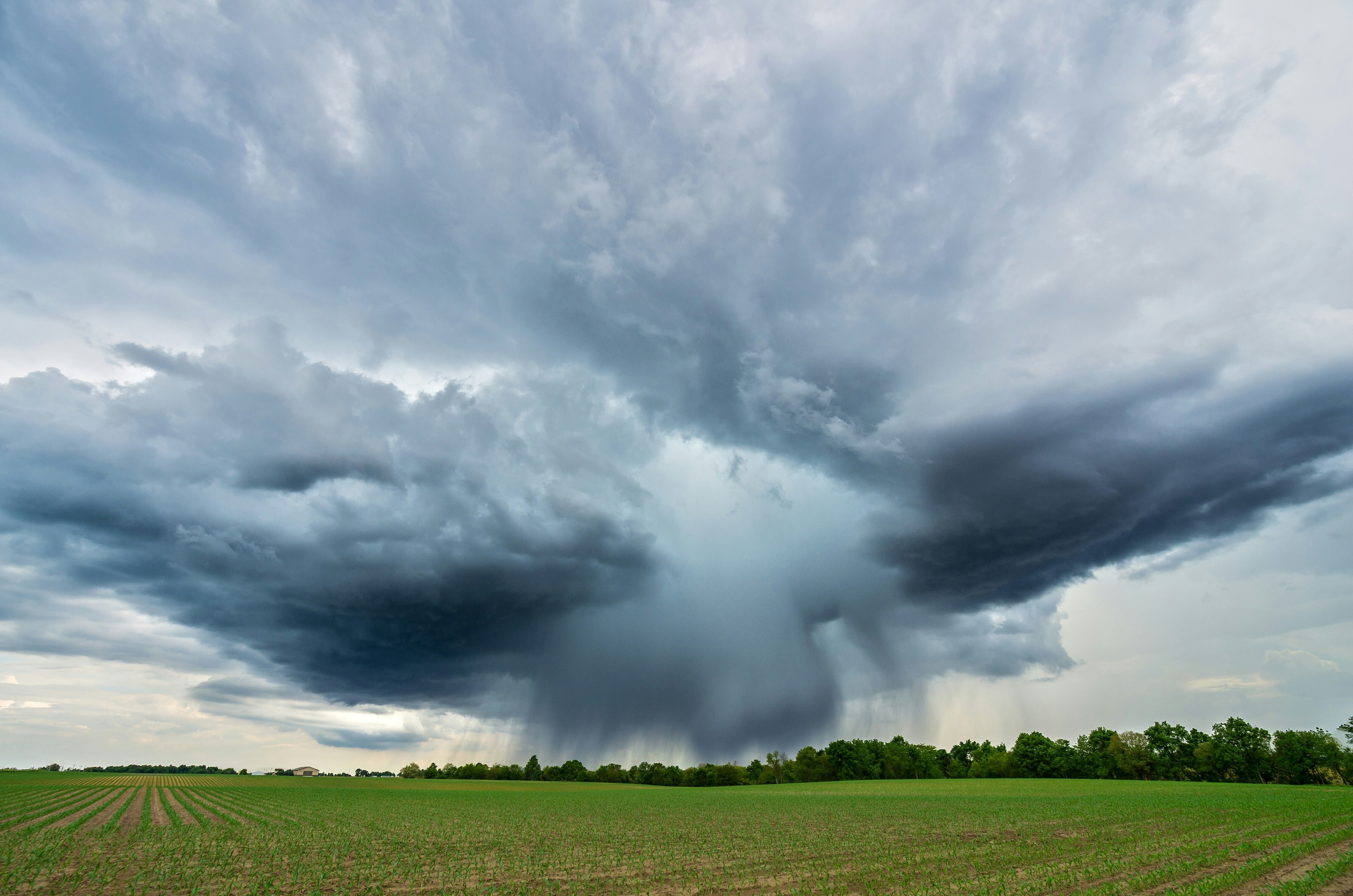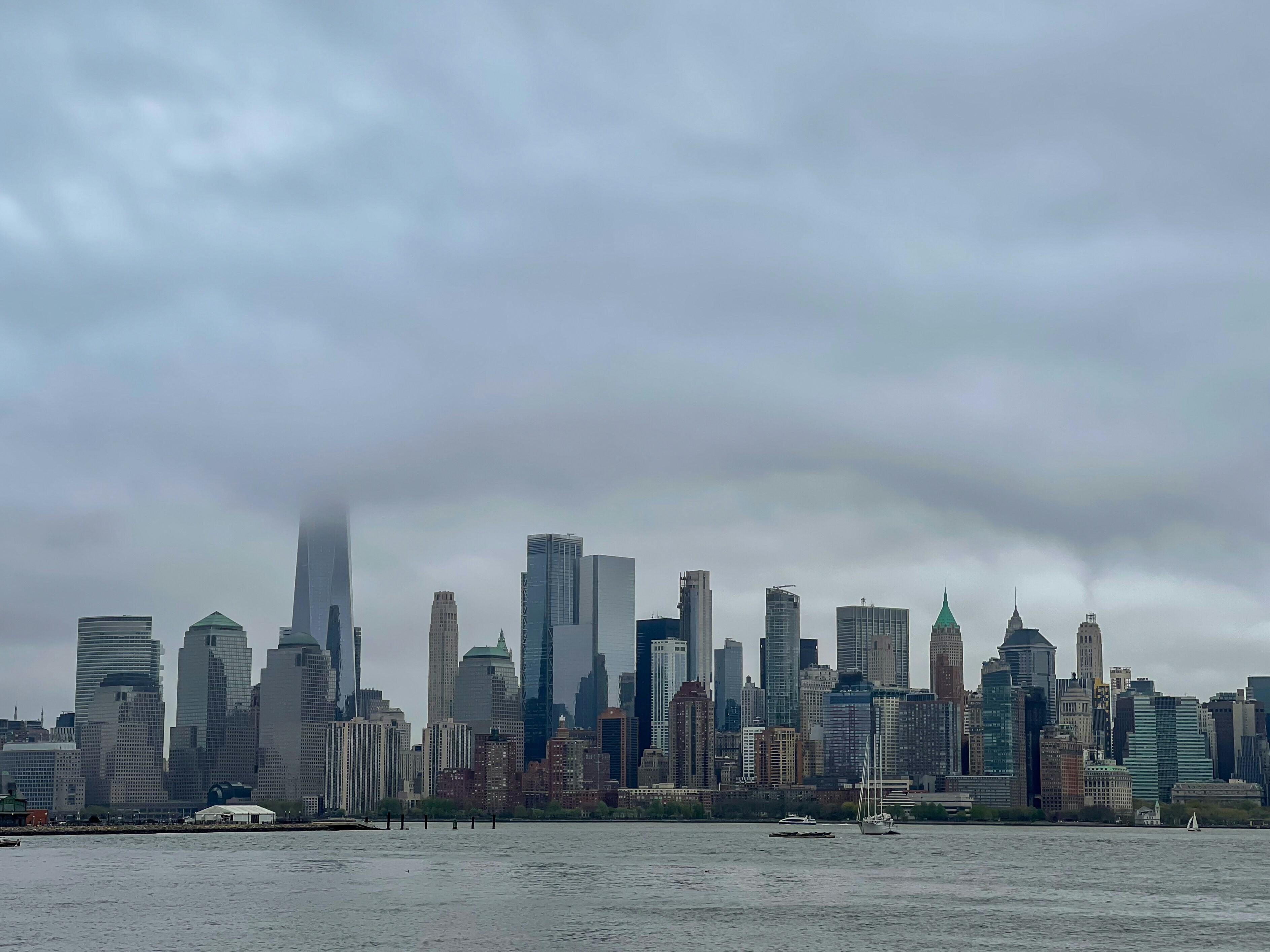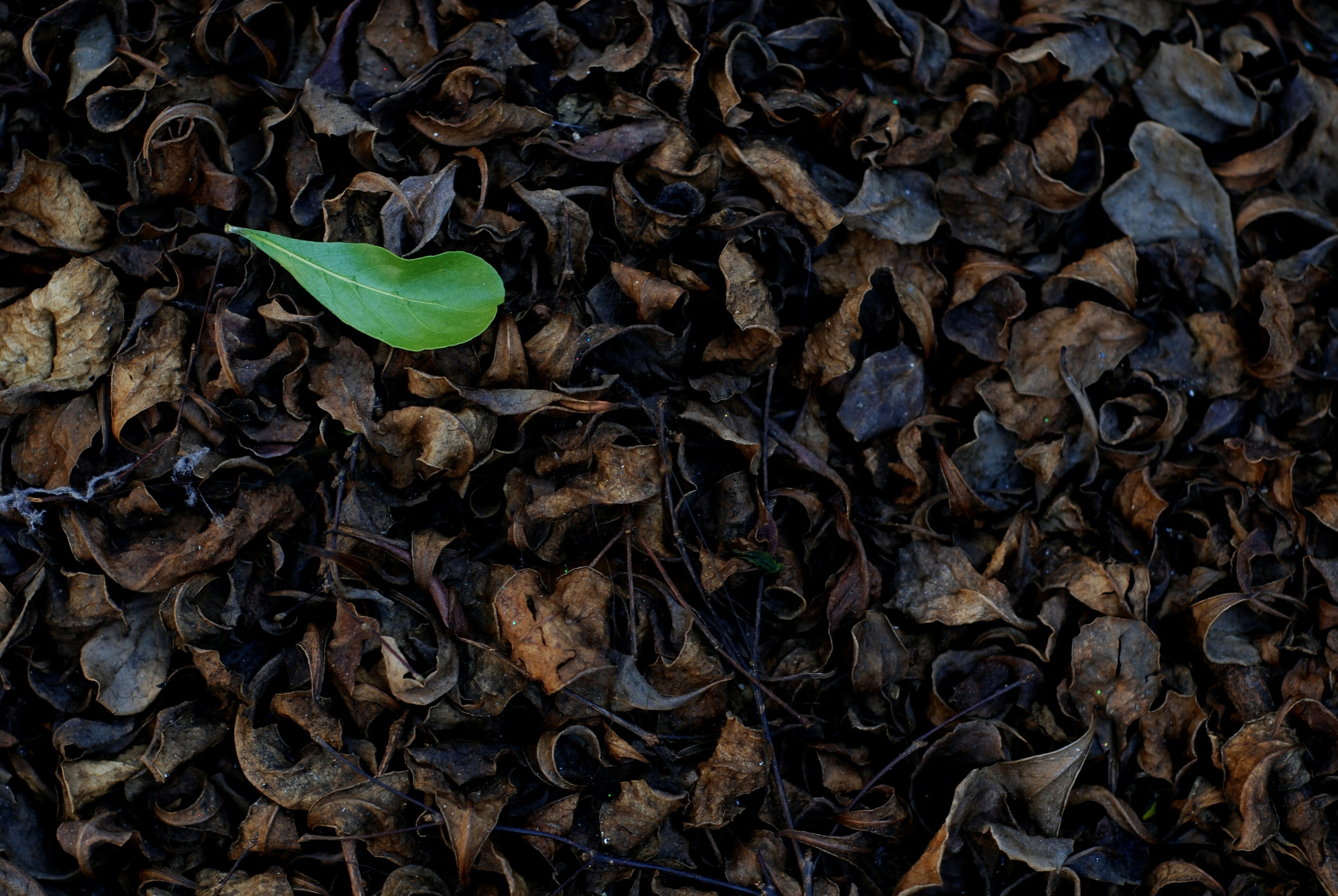Accept our marketing cookies to access this content.
These cookies are currently disabled in your browser.
Breathe! The cities working together on air pollution and climate change
Scroll down for full podcast transcript - click the ‘Show more’ arrow
How can cities - with ever growing populations - tackle air deadly pollution and reduce greenhouse gas emissions? Breathe Cities is a global network of cities sharing data, expertise and experience to do just that.
Guest: Jaime Pumarejo, Executive Director of Breathe Cities.
Links:
Breathe Cities: https://breathecities.org/
GAEA - Giving to Amplify Earth Action: https://initiatives.weforum.org/giving-to-amplify-earth-action/
Alliance for Clean Air: https://initiatives.weforum.org/alliance-for-clean-air/
World Economic Forum Centre for Nature and Climate: https://centres.weforum.org/centre-nature-and-climate/
Related podcasts:
Accept our marketing cookies to access this content.
These cookies are currently disabled in your browser.
Accept our marketing cookies to access this content.
These cookies are currently disabled in your browser.
Accept our marketing cookies to access this content.
These cookies are currently disabled in your browser.
Check out all our podcasts on wef.ch/podcasts:
Podcast transcript
This transcript has been generated using speech recognition software and may contain errors. Please check its accuracy against the audio.
Jaime Pumarejo, Executive Director, Breathe Cities: Air pollution is the silent killer, first and foremost, 8.1 million people a year are dying because of air pollution related health risks.
Robin Pomeroy: Welcome to Radio Davos, the podcast from the World Economic Forum that looks at the biggest challenges and how we might solve them.
Air pollution is the silent killer, and climate change is the existential threat - we hear how cities are tackling both.
Jaime Pumarejo: Our biggest goal is to reach 100 cities and hopefully get to 30% reduction in air pollution in those cities. And that would equate to more or less 30% reduction in greenhouse gas emissions in those cities.
Robin Pomeroy: The head of Breathe Cities, tells us about this global network of cities sharing expertise and experience in reducing air pollution - all over the world.
Jaime Pumarejo: You have Jakarta, Bangkok. We have Mexico, Rio de Janeiro, we have Paris. We're working a lot with Warsaw, Sofia in Bulgaria. There's a lot.
Robin Pomeroy: This former city mayor from Colombia says it is the people who live in the cities that are driving policies to improve the air they breath.
Jaime Pumarejo: The biggest driver going forward will be giving citizens the tools to ask for change.
Robin Pomeroy: And while climate change is a global problem, so much action on cutting emissions will be local - and done at city level
Jaime Pumarejo: I think this is one of the most ambitious climate change and health initiatives that's going on in the world right now.
Robin Pomeroy: Subscribe to Radio Davos wherever you get your podcasts, or visit wef.ch/podcasts where you will also find our sister programmes, Meet the Leader and Agenda Dialogues.
I’m Robin Pomeroy at the World Economic Forum, and with this look at how cities around the world are tackling air pollution and climate change, with the head of Breathe Cities
Jaime Pumarejo: This is an exciting time to be alive, and this is a big challenge to humanity. But I think we will make it.
Robin Pomeroy: This is Radio Davos.
I'm joined by Jaime Pumarejo who is the executive director of Breathe Cities. Jaime, how are you?
Jaime Pumarejo: I'm doing pretty good, thank you very much, and thank you for having me.
Robin Pomeroy: It's such a pleasure. So, tell us, what is Breathe Cities?
Robin Pomeroy: So tell us, what is Breathe Cities?
Jaime Pumarejo: So Breathe Cities is, a unique, I would say, programne. It came up because Sadiq Khan, the mayor of London, and Mike Bloomberg, former mayor of New York and obviously owner of Bloomberg, which is a big media and financial conglomerate. And what they argued was that the success of Breathe London, of giving people a lot more air quality and therefore helping reduce greenhouse gas emissions, and at the same time improving health, could be replicated and brought to other cities in the world.
So therefore they looked for good partners. And therefore, Bloomberg Philanthropies partnered up with Clean Air Fund, which ran a lot of the Breathe London programmes, and C40, which is a global convening or partnership of the biggest cities in the world that work for climate change. And then they rallied together and formed Breathe Cities, which in fact, what it tries to do is help mayors, help cities with data, with community outreach, with a lot of research and with policy change, to better the quality of lives of people, reduce air pollution and obviously reduce greenhouse gas emissions.
You have Jakarta, Bangkok. There's a couple that will come into play soon. We have Mexico, Rio de Janeiro, we have Paris. We're working a lot with Warsaw, which is a legacy city, one of the first that we worked with, Sofia in Bulgaria. So there's a lot.
Robin Pomeroy: Right. So quite diverse. It's all over the world, north and south, east and west. So what kinds of things will those cities be doing as a result of learning from each other? I mean, what kinds of things are we talking about?
Jaime Pumarejo: This is a great question because it's trying to get a good marriage between what can be replicated in places, for example, like Nairobi or Accra or Johannesburg, with Paris.
And a lot of people would think not a lot. But yes, there is a lot in terms of data. So how we collect data, and how we can learn from, for example, having the reference grade monitors, but also empowering communities to have wearable sensors that they can give to their children, for example, they'll have a football match and they can be wearing a wearable sensor, and then they can help upload this into our data networks and say, this is what's going on in the most underprivileged parts of Johannesburg or in Rio de Janeiro.
So there is a sense of a lot of data that is networked that we can learn from. And at the same time, it's not doing a cookie cutter approach of, for example, our low emission zones in Sofia or in Warsaw or London, bringing those to other places.
So just to give you a good example, we learned in Sofia that 70% of their climate emissions were due to their heating. They were using wood to heat their houses during the winter and to cook. So we helped the city with policy changes and with working with the Euro body so that they could get a programme in to replace these wood burning heating stoves and ovens, and to change them for electricity or gas powered ovens. And that made a big difference.
I think that it's also learning from what is going on in the world. But I would say another big thing this that we're trying to do is empowering local communities and grassroot community.
So just to give you another example, we have a partner called Smog Alert in Warsaw in Poland, where what they do is they empower social activists and environmental activists. So if you want to make a difference in your neighbourhood, in your street, in your city, they give you the tools so that you can become part of a network so that you feel empowered, that you have information and that you can make a difference.
So we're trying to get that person that's in a small neighbourhood in Warsaw to be able to communicate and learn from another person, that's, for example, in Accra or in Milan, so that they can work together and learn from each other and enact change.
Robin Pomeroy: That's really important because air pollution, it's one of those things, like a lot of environmental problems and probably a lot of health problems, that we often feel powerless to do anything about. If you're walking in a street that is heavily polluted, either from wood burning heating, as you mentioned there, or traffic rolling by, which we often blame for air pollution itself, there's nothing you can do about it, is there really? But you're saying perhaps there is.
Jaime Pumarejo: There is. And what I love about this is, before I was always working in biodiversity, and air pollution is a place where we can all meet because air pollution is the silent killer, first and foremost, 8.1 million people a year are dying because of air pollution related health risks. It is the second biggest health risk after coronary risk.
So it is a health factor. But also it's something that relates to your daily life and that we can change in a local level.
When we talk about climate change, it feels like this invisible monster that we can't do enough of, even though we try. But if we tackle it as an air pollution problem, then we can say, if I change my transportation habits, I can make a difference. If I change my heating habits, I can make a difference. If I ask my government to better the transportation matrix or the energy matrix, that that will make a difference and I will breathe cleaner air. If we can do that, there's a direct correlation between that and greenhouse gas emissions. So that means I'm also taking part.
So that's why I would say that our biggest goal is to reach 100 cities and hopefully get to 30% reduction in air pollution in those cities. And that would equate to more or less 30% reduction in greenhouse gas emissions in those cities. If we can do that, I think this is one of the most ambitious climate change and health initiatives that's going on in the world right now.
Robin Pomeroy: How did you get so interested in air quality and pollution? Tell us something about your background. You were a mayor in your home country of Colombia, in a city called Barranquilla. Tell me something about your experience there.
Jaime Pumarejo: I would say that I started because of working on environmental issues, because of inequality and the inter-generational legacy that we're going to leave our children and our grandchildren and our people.
And I would say the biggest asset that we have as a country in Colombia, for example, is our biodiversity and the quality of the water and the air we breathe. That is the biggest asset and it is an asset that everybody owns. If we are unable to to keep it, to preserve it and to use it to our advantage, then what we're going to have is it's lost. It's more poverty, it's more inequality, and in the end, less economic opportunity.
So as a mayor, I started to look at biodiversity and using what we have in our surroundings as a way to fill more jobs, to create quality of life. And therefore we started looking at how we preserve, but we also look at getting more air quality into the neighbourhoods that were more underprivileged. Then we could really get to the root of the problem and to show people that these issues matter to them.
When I started working on this, I thought that a lot of people were going to say, you know, this is not a priority. Get me a better school, get my kids in to better sports programmes. We want a better health system. But although they did demand these things and we were able to to better them, they understood that this was a priority as well.
And we changed what I would say collectively is the mindset that we were an industrial and commercial and port city, but that we changed to a view that we were all those things, but we were also immersed in an environment that was a river, the Caribbean Sea, and obviously the wetlands and the marshlands and the mangroves that engulfed.
So we were able to show people that we were part of the environment and that we could either be a positive part of it and make use of it and create jobs because of it. Or we could continue to destroy it. I think is the biggest legacy and the biggest learning point. And what got me excited.
Robin Pomeroy: You mentioned that air pollution is something that people can rally around because we all breathe the air, rich or poor, we would like to breathe cleaner air.
So it should be a kind of a unifying, almost depoliticised policy. But it isn't always that, is it? I mean, look at London, where I used to live, there's been quite a lot of opposition to measures restricting diesel cars, for example, and for people who don't have cars in London, which is, I don't know, probably a majority, they're quite delighted that those vehicles are off the road, but there is a quite a vocal part of the population, maybe a middle class, saying these are the ivory tower kind of greenies, the woke, stopping us going about our daily lives as best we can. Does that come up in all these various cities and how do you respond to that?
Jaime Pumarejo: It is a reality that we need to change the way we live in order to make a livable planet and the more healthy city environment. So yes, there are drawbacks and yes, it has been politicised.
And unfortunately, I guess the change that we have to make that force us to change our habits and to become uncomfortable in some instances, has been politicised because we forget the bigger picture and the goal.
So what we've been trying to do is to show people that there is a problem and politicians sometimes forget to participate communities, I guess in the instance of a problem identification. We tend to go towards, how are we going to solve something? Instead of saying this is the problem, and the problem is we have air quality problems in more than 90% of the cities around the world. That means people are dying. People have chronic diseases. Children are the most vulnerable to this, and the most impoverished and underprivileged communities are the most affected.
So this is the problem. How do we fix it? There's a huge number of opportunities or solutions that you can pick. But if you can sit down with communities and start looking at which one will affect you the least, then you can find a common ground.
In London, it was, I would say, a politicised issue. It became, I would say, the target of fake news as well. But in the end, I think that we have to recognise that even the best policies have negative outcomes for some people. If we're able to tackle those head on and talk to these people that will be affected, to try and offer them solutions, and in the end acknowledge that there will be a shift in their habits and that there will be uncomfortableness, then we can work towards reducing that noise and that drawback.
Because these are things we have to do. We just need to find a way that they can be done with a less pushback and obviously without hurting a lot of people.
Robin Pomeroy: And are you seeing results where air quality is improving? You know, there's a constant demand for energy use, transport, heating, air conditioning, cooking. Cities are growing all the time, most of them. You would imagine the pressures on the environment, on air quality, are increasing all the time. Are you seeing air pollution go down in some of these places?
Jaime Pumarejo: Yes. For example, one of the biggest examples to me is Sofia and how they were able to use, exchanging heating by something as polluting as low quality wood to change that to electric and gas stoves, and then make a huge difference.
The ULEZ in London is showing that even the recently implemented ULEZ is already having a positive impact, especially in school streets and places where they are measuring.
We're also seeing that Warsaw is already within the European standards of air quality. And when we started working with them, it was one of the worst cities in air pollution of the euro zone.
So things that have been done there in transport, in heating, in the newly implemented low emission zones, is actually working.
And we're also seeing that a change in conscience is also having a positive effect in communities, because they start to take politicians and the government accountable for the quality of the air they breathe. We don't see it. We don't notice the type of silent killer that a polluted air is. But if we're able to understand the measurements and the air quality data, then we can ask for change. And I think that's the biggest driver going forward, will be giving citizens the tools to ask for change.
And one thing that we've talked to corporations about is that they are for changing the way they work and produce, as long as they have the possibility to be treated equally, so that there are no types of corporations or sectors that have more leeway or are less enforced in policy than others. They're saying if it's an equal playing route, then we'll adapt and we'll change and we'll participate positively.
And that's what we're trying to work with government as well, telling them that let's do this policy, but let's also work on enforcing health. So a lot of the things that we're doing is we're not even changing policy. We're beefing up the way that cities can actually enforce the policies that they already have.
Robin Pomeroy: What other sectors will be impacted or involved in air quality in cities?
Jaime Pumarejo: We do a source apportionment in a lot of these areas or cities, in which we try and understand where the air pollution is coming from, and then we try and work with a specific industry.
So it's not a single identical approach in each city. But for example, I know that in some cities the energy sector is one where we're trying to work on to get some of the thermal electrical plants, to switch from diesel burning over to gas burning or from coal burning over to gas burning, and then have a plan for renewables, so that there is a plan on the long term. And also demonstrating that a lot of these thermal electrical plants are upwind from a lot of these populations. So they are actually not helping air quality in a lot of these vulnerable neighbourhoods in the cities or the perimeter.
The other thing that we're seeing is that industries specific to certain country also have a part to play, some because policies that are in place are not being enforced. So industries like textile industries, like, for example, manufacturing, also have a part to play. And we don't have to ask more of them. We just have to ask that what is in place right now works, and that if something needs to change, that we can work with local government to change. Industry does have a big part.
Robin Pomeroy: So you have these 11 cities now. You want to expand that to 100. How do you recruit cities? Are you going around the world saying you've got a problem here, come and join us and we can help you? Or are they coming to you and knocking on your door and saying, we like what you're doing here, can you help us?
Jaime Pumarejo: It's sort of a mix and match approach. We have a theory of change in which how we can get a city, then a region, and then a country to change, and that goes with the Clean Air Fund and C40.
If we're able to work with a local government and show that these things are possible, then we can get other cities that work, that are surrounding or that are within the same country, to also want to join, and then we can build a regional bloc. Then this regional bloc will also help us, in a sense, change national policy and help momentum so that national policy can change.
So that is one of the avenues that we're looking at is growing within regions or cities that we're already in. So if we are in a country and we are in a city, how can we take other cities that are secondary and tertiary in population but that are part of that ecosystem?
The other thing is growing in places where it makes a lot of sense, because these are cities that are ripe for change: high in population, they have a city government that wants to make a difference, that wants the change. So when we check all those boxes, when we say we can open a new geography, but we need the willingness of local government, we need the check on how much we can actually make the difference. And that means the type the air pollution that they currently have and the size or population.
So if these things start to coalesce, then we'll go into a territory. And obviously there are a lot of cities there are also pointing out that they would want to be a part of the project. And then we start to work on those.
And one of the things that we also want to add is to add sort of a toolkit and a methodology so that others can take our learnings and roll with them and not necessarily wait for Breathe.
If you ask me what in these new buzzwords of soft power, new power and giving up power of brands and of corporations, if I was thinking what should happen to Breathe Cities, to me it should be an idea, a methodology, and a toolkit that cities could take on their own and use in the near future and not even have to talk to me or anybody from our team. Just roll with what we've learned and make sure that they're using it correctly.
Robin Pomeroy: So if someone listening to this as they're walking down their street breathing in air that is not healthy for them, what would you advise them to do to maybe start a change?
Jaime Pumarejo: There are a lot of NGOs and civil society organisations that are already working on this. Fairly easy to find them. If not, you can reach out to us on our social media at Breathe Cities.
And also, I would say, encourage your local government leaders to care about air pollution.
In the formative years. In the youngest years of our children, they are most exposed to air pollution. Even if you're running a marathon since you are inflamated, since you are using more of your lung capacity, you are more vulnerable to air pollution than you think. So even if you are one of the healthiest people in your street or block, you are most propensity for health issues related to air pollution if you constantly exercise, if you actually are out there getting out and about.
So I would encourage you to learn more about it and to ask your local government to care about this and hopefully start tackling this.
Robin Pomeroy: A world where cities are growing, demands are growing, consumption is growing. Are you optimistic?
Jaime Pumarejo: Yes. I think we can make a difference. And I think people are waking up to that.
And there are simple things that we can do, try and use active mobility, or always think about the way that we affect air pollution and greenhouse gases.
I think that there is a way forward. I think that the challenge given to the world right now is, how do we continue to give quality of life to the people that don't have it? How do we continue to industrialise countries that are below the poverty threshold, but do so in a way that is sustainable with the environment? We need to change the way we think about economic development, and this is an exciting time to be alive, and this is a big challenge to humanity. But I think we will make it.
Robin Pomeroy: Jaime Pumarejo, thank you very much for joining us on Radio Davos.
Jaime Pumarejo: Oh, it's been a pleasure.
Robin Pomeroy: Jaime Pumarejo is Executive Director of Breathe Cities.
Through the World Economic Forum’s Giving To Amplify Earth Action initiative - also known as GAEA - the Forum collaborates with Breathe Cities to help unlock additional philanthropic capital to scale and expand its work in cities across five continents to drastically cut air pollution and climate emissions.
Find out more at breathecities.org or search for Giving to Amplify Earth Action.
Please subscribe to Radio Davos wherever you get your podcasts and please leave us a rating or review. You can find all our podcasts at wef.ch/podcasts. And join the conversation on the World Economic Forum Podcast club on Facebook.
This episode of Radio Davos was written and presented by me, Robin Pomeroy. Editing was by Jere Johansson. Studio production was by Taz Kelleher.
We will be back next week, but for now thanks to you for listening and goodbye.
Topics:
Climate ActionMore episodes:
More on Climate ActionSee all
Elizabeth Henderson
September 16, 2025
Cornelius Pieper and Nicky Collins
September 15, 2025
Lindsey Hall
September 15, 2025
Joe Myers
September 12, 2025
Emilian Axinia
September 11, 2025

